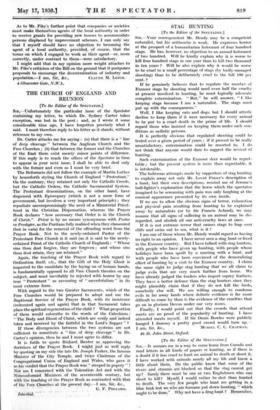THE CHURCH OF ENGLAND AND . REUNION [To the Editor
of the SPEcraTon.]
Sm,—Unfortunately the particular issue of the Spectator containing my letter, to which Dr. Sydney Carter takes exception, was lost in the post ; and, as I wrote it some considerable time ago, I have forgotten precisely what I Said. I must therefore reply to his letter as it stands, without reference to my own.
Dr. Carter attaCks me for saying : (a) that there is a " line of deep cleavage " between the Anglican Church and the Free Churches ; (b) that between the former and the Churches Of the East there exist merely minor pOints of difference. If this reply is to reach the offices of the Spectator in time to appear in your next issue; I shall be able to deal only with the fornier and even so I must be very brief.
The Reformers did not follow the example of Martin Luther by henceforth styling the Church of England " Protestant." On the contrary, they retained not only the Catholic Creeds, but the Catholic Orders, the Catholic Sacramental System. The' Protestant denothinations, on the- other hand, have dispensed with Episcopacy (which is not a mere form of gOvernment, but involvesi a very important principle) ; they repudiate uncompromisingly the need of a Ministerial Priest- hood in the Christian Dispensation, whereas the Prayer Book declares " ho* necessary- that Order is in the Church of Christ." Priest is by no means synonymous with Pastor or Presbyter, as the Puritans fully realized when they elamotired (but in vain) for the removal of the offending word from the Prayer Book. Not to the newly-ordained Pastor of the Protestant Free Church is it said (as .it is said to the newly- ordained Priest of the Catholic Church of England) : " Whose sins thou dost forgive, they are forgiven ; and whose sins thou dost retain, they-are retained."
Again, the teaching of the Prayer Book with regard to . . Ordination itself, viz., that the Gift of the Holy, Ghost is imparted to the candidate by the laying on of human hands, is fundamentally opposed to all Free Church theories on the subject, and must inevitably be rejected with horror by any true " Protestant " as savouring of " sacerdotalism " in its most extreme form.
With regard to the two Gieater Sacraments, which of the Free Churches would be prepared to adopt and use the Baptismal Service of the Prayer Book, with its insistence (reiterated again and again) that in that _Sacrament takes place the spiritual regeneration of child ? What proportion of them would subscribe to the words of the Catechism: " The Body and Maid, of Christ, which are verily and indeed taken and received by the faithful in. the Lord's Supper ?
If these .divergencies between the two systems are not sufficient to constitute a " line. of deep cleavage " in Dr. Carter's opinion, then he and I must agree to differ. It is futile to qUote Riebard . Baxter as,. approving the doctrines of the prayer- Book. I-might -just as well .reply by quoting on my side the late Dr. Joseph Parker, the famous Minister of the city Temple, and twice Chairman of the Congregational Union of -England and Wales, who gave it as his verdict that the Prayer Book Was " steeped in popery " Ndi aiu I concerned with the Toleraiion Act and with the NoncOnfotaiik hfiniiterS_ of the seventeenth century, but with the teaching of the Prayer Book as contrasted with that of the-Free Churches at the present day.—I am, Sir, &c., G. F. POLLARD.














































 Previous page
Previous page